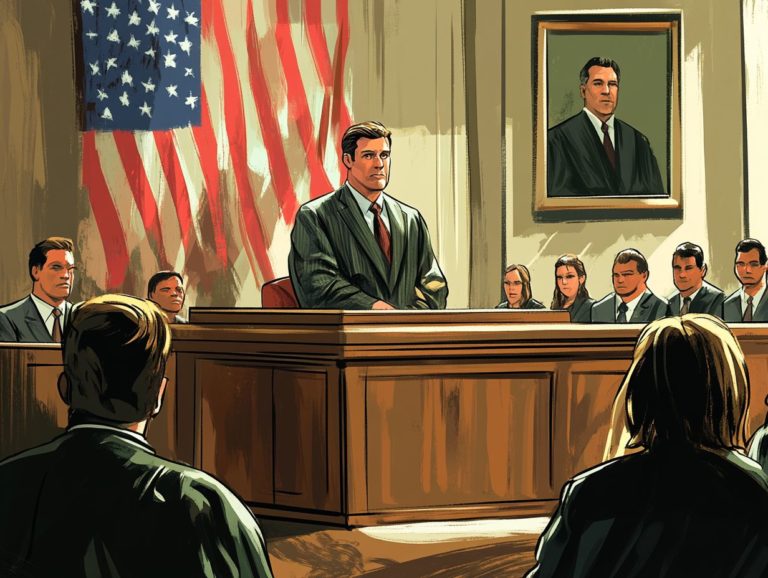5 Strategies for Finding the Right Defense Attorney
Choosing the right defense attorney can feel overwhelming, but it’s a crucial step in navigating the challenges of the legal system.
With many options available, how can you ensure that you make the best choice for your situation?
This article presents five essential strategies to help you find the right defense attorney. You’ll learn to identify your legal needs, verify credentials, and more.
You’ll also explore key factors to consider, the different types of defense attorneys, and what to avoid during your search.
Get ready to make a decision that can change the outcome of your case!
Contents
- Key Takeaways:
- 1. Determine Your Legal Needs
- 2. Research Potential Attorneys
- 3. Consider Their Experience and Specialization
- 4. Schedule Consultations
- What Are the Key Factors to Consider When Choosing a Defense Attorney?
- Frequently Asked Questions
- What are the five strategies for finding the right defense attorney?
- How can I conduct research to find the right defense attorney?
- Is asking for referrals a reliable way to find the right defense attorney?
- Why is it important to consider the experience and specialization of a defense attorney?
- How can I evaluate the communication skills of a defense attorney?
- What should I discuss regarding fees and payment options when looking for a defense attorney?
Key Takeaways:
- Determine your legal needs before searching for a defense attorney.
- Research potential attorneys and consider their experience and specialization.
- Schedule consultations and ask for references and reviews.

1. Determine Your Legal Needs
Determining your legal needs is the crucial first step in navigating criminal law. This process helps you identify the specific issues surrounding your case and select a professional who can advocate for you effectively.
Whether you’re facing charges related to driving under the influence (DUI), theft defense, or other criminal allegations, understanding your situation is essential in choosing an attorney who specializes in those areas.
By managing your expectations from the start, you can influence your experience in the legal process, aligning your goals with the expertise of seasoned attorneys.
Understanding your situation helps you find a lawyer skilled in specific case types. For instance, a DUI charge may require a different strategy than a theft allegation, highlighting the importance of tailored legal representation.
As you evaluate qualifications, past case results, and personal rapport during consultations, you can better assess how well an attorney’s approach matches your unique circumstances. This understanding enables informed decisions, paving the way for a favorable outcome in complex legal situations.
2. Research Potential Attorneys
Researching potential attorneys is essential to find a professional with extensive experience in local courts and a proven track record in criminal defense cases.
To make an informed decision, leverage online reviews, testimonials, and recommendations from trusted sources. These resources provide insights into an attorney’s reputation and their approach to cases similar to yours.
Evaluating the history of successful cases is equally crucial; it reveals not just the attorney’s capabilities but also how well their experience aligns with your specific legal needs.
By examining these factors, you can determine whether an attorney will be a supportive ally in navigating the legal system.
3. Consider Their Experience and Specialization
When selecting a defense attorney, consider their qualifications, experience, and specialization in criminal law, as these factors significantly influence their ability to craft effective defense strategies for your case.
An attorney’s educational background shapes their understanding of criminal statutes and legal precedents. For instance, choosing a lawyer from a law school known for its criminal law program might offer insights that others could overlook.
Hands-on courtroom experience is crucial; a seasoned attorney who knows local judges and prosecutors can anticipate their reactions, which can be pivotal in negotiations.
Take a DUI case as an example an attorney with a strong history in similar cases will likely understand local laws and potential plea deals far better than someone who usually handles personal injury claims. Specialized knowledge can truly enhance your legal representation.
4. Schedule Consultations

Scheduling consultations with potential defense attorneys is essential. This enables you to discuss your specific needs, assess their fee structure, and explore available payment plans for legal support.
During these meetings, you can gain valuable insights into how the attorney approaches case strategy. This will help you determine if their approach aligns with your objectives.
It s important to ask relevant questions. Inquire about their experience with similar cases, the anticipated timeline for outcomes, and their preferred methods for communicating updates.
Ensuring compatibility in values and understanding your personal needs can greatly influence the effectiveness of the attorney-client relationship. Engaging in open dialogues fosters trust and transparency, which are crucial for your peace of mind and success.
What Are the Key Factors to Consider When Choosing a Defense Attorney?
Choosing the right defense attorney is a crucial step toward your future! Pay careful attention to several critical factors. You ll want to consider their experience in criminal defense and their track record of successful cases.
Additionally, assess their reputation within the legal community for delivering competent representation. Ensure that the attorney has a deep knowledge of criminal law and is familiar with specific offenses relevant to your case.
Their courtroom experience can significantly influence both strategy and outcomes. A lawyer who regularly navigates your local courts may have established beneficial relationships with judges and prosecutors.
The attorney must also be able to listen and comprehend your unique legal needs. They should provide sound legal advice and be approachable enough for you to voice your concerns and ask questions throughout the legal process.
What Are the Different Types of Defense Attorneys?
There are various types of defense attorneys, each specializing in different aspects of criminal law. They tackle specific cases, ranging from DUI to theft defense.
For instance, a dedicated attorney for DUI charges will expertly navigate the complexities involved. In these cases, tests to check if someone is sober and breathalyzer results can significantly sway the outcome in your favor.
If you find yourself facing theft charges, attorneys specializing in that area will have tailored strategies. They can challenge evidence or establish intent key elements that differentiate between petty theft and grand larceny.
White-collar crime lawyers take a different approach altogether. They use their expertise in corporate regulations and financial law to effectively combat charges like embezzlement or fraud.
Each specialization offers unique insights and methodologies. These can profoundly impact your case strategy and potential sentencing. It’s essential to choose the right attorney for your situation!
How Can a Defense Attorney Help with Your Case?
A defense attorney plays an essential role in your legal journey. They provide expert representation and craft a tailored case strategy to ensure a competent defense that upholds the principles of justice.
Their assistance begins with an initial consultation. Here, they assess the specifics of your case, listen to your concerns, and clarify potential outcomes.
By meticulously analyzing evidence and interviewing witnesses, they build a robust foundation for your defense. Their expertise in criminal law becomes invaluable during plea negotiations and courtroom representation.
As they navigate the complexities of the legal system, they advocate passionately on your behalf. They offer strategies designed not only to secure favorable verdicts but also to minimize long-term repercussions, ensuring that justice is served effectively.
What Questions Should You Ask During a Consultation?

During a consultation, make sure to ask relevant questions that help you assess the attorney’s qualifications, past case results, and fee structure. This ensures they align with your legal needs.
Understanding their experience with cases similar to yours is also important. This insight can shed light on the attorney s effectiveness and approach.
Don t hesitate to ask how they develop their case strategy and which factors they consider critical for your situation.
Questions regarding their communication style and how often they will update you can foster an open dialogue. This is vital for establishing a strong attorney-client relationship.
Such candid exchanges enable you to determine whether the attorney is the right fit for your unique legal challenges.
What Are the Warning Signs of a Bad Defense Attorney?
Identifying the warning signs of a bad defense attorney is crucial for ensuring you receive the competent legal representation you deserve. Certain red flags indicate a lack of experience or a poor reputation that you want to avoid.
For example, if a potential attorney has many negative client testimonials, it might suggest a troubling pattern of dissatisfaction one that could lead to a similar experience for you.
A noticeable lack of communication from your attorney can lead to anxiety and uncertainty, leaving you in the dark about your case’s progress.
Another factor to consider is a high turnover of cases. If an attorney frequently switches clients, it may reveal difficulties in maintaining relationships or achieving satisfactory outcomes.
Each of these elements not only erodes trust but could significantly impact your chances of securing a favorable result in your case. Act quickly if you notice these red flags!
How Can You Verify the Credentials and Reputation of a Defense Attorney?
Verifying the credentials and reputation of a defense attorney is essential to ensure you’re selecting a qualified professional. You can explore various avenues, such as online reviews and checking their qualifications.
Checking state bar associations where attorneys are licensed to practice law offers vital insights into the attorney’s licensing status, disciplinary history, and any potential client complaints.
Professional directories can serve as trustworthy sources of information, detailing an attorney’s specialties and experience.
Platforms like Avvo and Martindale-Hubbell provide ratings and reviews, allowing you to assess an attorney s standing among peers. This is invaluable for making an informed decision.
By leveraging these resources, you can confidently entrust your legal matters to someone with a solid reputation and a proven track record.
Frequently Asked Questions
What are the five strategies for finding the right defense attorney?

The five strategies for finding the right defense attorney are: conducting research, asking for referrals, considering experience and specialization, evaluating communication skills, and discussing fees and payment options.
How can I conduct research to find the right defense attorney?
You can conduct research by looking up attorneys online through their websites or legal directories, reading reviews and testimonials, and checking their credentials and past cases.
Is asking for referrals a reliable way to find the right defense attorney?
Yes, asking for referrals from friends, family, or other attorneys can be a reliable way to find the right defense attorney. They can provide personal experiences and recommendations.
Why is it important to consider the experience and specialization of a defense attorney?
Experience and specialization can greatly impact the outcome of your case. It is important to choose a defense attorney who has expertise in handling cases similar to yours.
How can I evaluate the communication skills of a defense attorney?
You can evaluate communication skills by scheduling a consultation and observing how the attorney listens and responds to your questions and concerns. It’s essential to choose an attorney who is transparent and keeps you informed throughout the legal process.
What should I discuss regarding fees and payment options when looking for a defense attorney?
It’s crucial to discuss the attorney’s fees and payment options early on. This ensures you can afford their services and helps prevent any money problems later.
Ask how the attorney will bill you. Make sure to find out if they offer payment plans or other options that could fit your budget.






